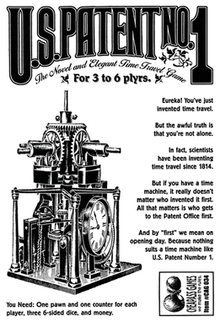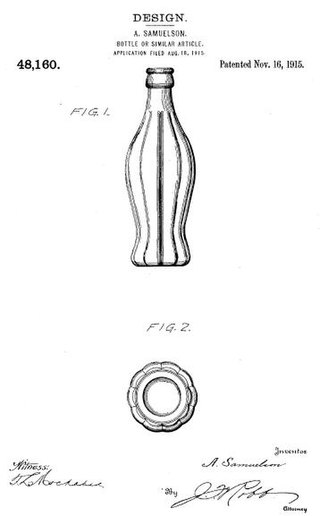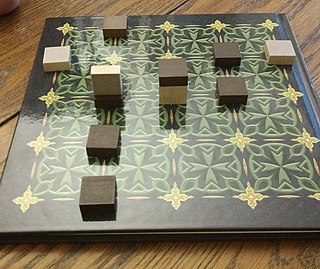 | |
| Manufacturers | Cheapass Games |
|---|---|
| Designers | Falko Goettsch James Ernest |
| Publication | 2001 |
| Players | 3 to 6 |
| Playing time | 60 minutes |
U.S. Patent No. 1 is a board game designed by Falko Goettsch & James Ernest, and published by Cheapass Games in 2001.
 | |
| Manufacturers | Cheapass Games |
|---|---|
| Designers | Falko Goettsch James Ernest |
| Publication | 2001 |
| Players | 3 to 6 |
| Playing time | 60 minutes |
U.S. Patent No. 1 is a board game designed by Falko Goettsch & James Ernest, and published by Cheapass Games in 2001.
Each player's goal is to assemble a complete time machine (requiring a weapon, shield, power source, and chassis), and travel back to the day the U.S. Patent Office opened, so as to secure the first US patent.
The first actual U.S. patent was issued on July 31, 1790, to Samuel Hopkins for the manufacture of potash. The game's cover art states that "if you have a time machine, it doesn't really matter who invented it first. All that matters is who gets to the Patent Office first." However, prior to the 2011 America Invents Act, the United States was the sole country with a "first to invent" rule. Unfortunately, proving prior conception when time travel is involved may present difficulties to the inventor.
The game was nominated for the Origins Award for Best Science Fiction or Fantasy Board Game of 2001, [1] but lost to Risk 2210. [2]
Cheapass Games no longer supports the game, but has made the complete game available for free download on their "Boulevard of Broken Games" page. [3]

Steve Jackson Games (SJGames) is a game company, founded in 1980 by Steve Jackson, that creates and publishes role-playing, board, and card games, and the gaming magazine Pyramid.

Kill Doctor Lucky is a humorous board game designed by James Ernest and released in 1996 by Cheapass Games. In 1998, Kill Doctor Lucky won the Origins Award for Best Abstract Board Game of 1997.

An invention is a unique or novel device, method, composition, idea or process. An invention may be an improvement upon a machine, product, or process for increasing efficiency or lowering cost. It may also be an entirely new concept. If an idea is unique enough either as a stand-alone invention or as a significant improvement over the work of others, it can be patented. A patent, if granted, gives the inventor a proprietary interest in the patent over a specific period of time, which can be licensed for financial gain.

Icehouse pieces, or Icehouse Pyramids, Treehouse pieces, Treehouse Pyramids and officially Looney Pyramids, are nestable and stackable pyramid-shaped gaming pieces and a game system. The game system was invented by Andrew Looney and John Cooper in 1987, originally for use in the game of Icehouse.
Andrew J. Looney is a game designer and computer programmer. He is also a photographer, a cartoonist, a video-blogger, and a marijuana-legalization advocate.
Cheapass Games is a game company founded and run by game designer James Ernest, based in Seattle, Washington. Cheapass Games operates on the philosophy that most game owners have plenty of dice, counters, play money, and other common board game accessories, so there is no need to bundle all of these components with every game that requires them. Cheapass games thus come packaged in white envelopes, small boxes, or plastic resealable bags containing only those components unique to the game - typically a rules sheet, a playing board printed on card stock, and game cards banded by magazine-cutout "sleeves". This allows the company to produce games for prices well below the market average. Later, Cheapass started offering some higher-quality, full color games under the "James Ernest Games" brand.
Chrononauts is a family of card games that simulates popular fictional ideas about how time travellers might alter history, drawing on sources like Back to the Future and the short stories collection Travels Through Time. The game was designed by Andrew Looney and is published by Looney Labs. The original game and a variant each won the Origins Award for Best Traditional Card Game.

Give Me the Brain is a discard-style card game designed by James Ernest and released in 1996 by Cheapass Games. In the game, players assume the role of zombies attempting to complete their tasks for the day at Friedey's, "the fast food restaurant of the damned", yet they only have one brain to share between them. The game inspired several sequels, all set at Friedey's.
Looney Labs, Inc. is a small game company based in College Park, Maryland, United States. It is named after its founders, Andrew Looney and Kristin Looney, and is best known for creating the Fluxx line of card games. The company has three U.S. patents and eight Origins Awards.

Elizabeth J. Magie Phillips was an American game designer, writer, feminist, and Georgist. She invented The Landlord's Game, the precursor to Monopoly, to illustrate teachings of the progressive era economist Henry George.
Button Men is a two-player dice game invented by James Ernest of Cheapass Games, first released in 1999.
Brawl is a real-time card game designed by James Ernest and released in 1999 by Cheapass Games.
The Great Brain Robbery is a board game designed by James Ernest and released in 2000 by Cheapass Games.

In the United States, a design patent is a form of legal protection granted to the ornamental design of an article of manufacture. Design patents are a type of industrial design right. Ornamental designs of jewelry, furniture, beverage containers and computer icons are examples of objects that are covered by design patents.
The United States is considered to have the most favorable legal regime for inventors and patent owners in the world. Under United States law, a patent is a right granted to the inventor of a (1) process, machine, article of manufacture, or composition of matter, (2) that is new, useful, and non-obvious. A patent is the right to exclude others, for a limited time from profiting from a patented technology without the consent of the patent holder. Specifically, it is the right to exclude others from: making, using, selling, offering for sale, importing, inducing others to infringe, applying for an FDA approval, and/or offering a product specially adapted for practice of the patent.

Mike Selinker is an American game designer, puzzle maker, and the founder and president of Lone Shark Games.
J. Hunter Johnson is a freelance American game designer, author, and translator. He has translated many game rules and websites from German for Mayfair Games. He has authored or co-authored six books for Steve Jackson Games, including GURPS Monsters and GURPS Japan and designed two games for White Wolf Publishing, including gToons, which proved popular among children on Cartoon Network's Cartoon Orbit children's website and left an impact on how such websites use digital trading cards for online gaming.
Diceland is a tabletop game played with collectible sets of dice designed by Toivo Rovainen and James Ernest and released in 2002 by Cheapass Games. Players roll paper cut-out octahedral dice into a combat arena. The dice are then used in the same way as miniatures - they can be moved around the arena and attack other dice.
One False Step for Mankind is a board game designed by James Ernest and published by Cheapass Games in 2003. Players play the role of town mayors, seeking to become governor of California in 1849. According to the game rules "It's one false step for Mankind, one giant leap for you." This is a clear play on astronaut Neil Armstrong's first spoken words on the surface of the Moon in 1969.

Tak is a two-player abstract strategy game that first existed fictionally within Patrick Rothfuss's fantasy trilogy, The Kingkiller Chronicle, before being brought to life by James Ernest in collaboration with Rothfuss, and published by Cheapass Games in 2016. In 2021, Tak was incorporated as an event in the international Mind Sports Olympiad.